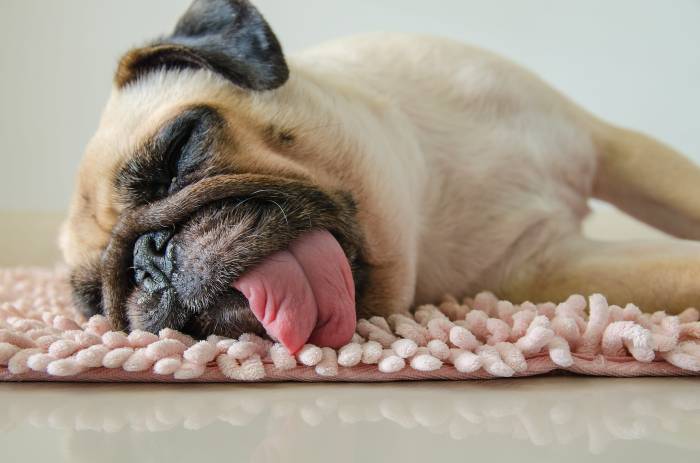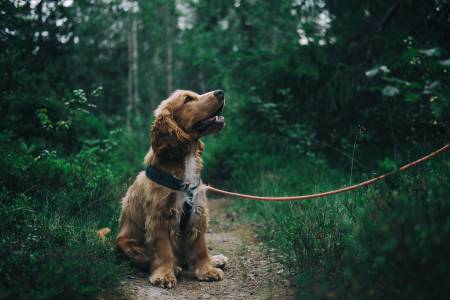Connect with a verified veterinarian in minutes. Licensed vets are available 24/7 to answer your questions. No need to worry about your furry family member.
Have you noticed that your dog is breathing fast through his nose while sleeping? Are you worried he could be suffering from a medical condition? If so, then you’ve come to the right place! It’s scary when our fur babies look as if they’re having a problem breathing or are sick.
In this article, we’ll take a look at why dogs breathe fast and whether or not this is normal during sleep. Let’s get started!
Why is My Dog Breathing Fast?
Before you can determine if your dog is breathing fast or not, it’s necessary to establish your dog’s normal breathing rate. For most dog breeds, a healthy dog breathes between 15 to 35 breaths per minute when at rest. So, when your dog has been resting for a while, try to count his breaths for one minute. If he’s over 40 breaths per minute, then there may be a problem. It’s recommended that you see the vet and have your canine companion checked.
There are some normal reasons a dog may be breathing fast. For instance, he may be panting on a warm day. This is a dog’s way to cool off. Dogs don’t have sweat glands as we do. So, the only way to cool themselves off is by panting. This fast breathing method can work to cool their body down. Panting is the dog’s way of regulating his body temperature.
Your dog may also breathe fast after exercising. Even a walk may be enough to make your dog breathe a little harder than normal. However, this type of breathing falls within the normal realm, as long as your dog’s breathing returns to normal after he rests.
Why is My Dog Breathing Fast When Asleep?
Most of the time, a dog breathing fast through their nose during sleeping is normal. That’s because, just like us, dogs go through REM sleep. REM sleep is a time when our dogs sleep hard. This is the phase of sleep when dogs dream. During this phase, brain waves are fast and irregular, and muscles are more relaxed. However, the mind is very active. You can see these when your dog’s eyes are moving rapidly under his eyelids. This is REM (rapid eye movement) sleep.
It’s during REM that your dog may move his legs, whine, bark, and breathe rapidly. If your dog is breathing fast when he’s at this phase of sleep, he may be dreaming about chasing that bunny he saw in the yard earlier in the day! So, if your dog is chasing a bunny (or other things) in his sleep, then he will naturally breathe hard.
This type of breathing fast through the nose is completely normal in dogs. It usually lasts a few minutes, and then your dog calms down again, and his breathing slows. However, if your dog continues to have fast breathing after REM sleep, then there could be an underlying medical problem.

Review symptoms, medications & behavior to keep your pets healthy with a Vet Online in just minutes.
Ask a Vet Live NowIs my Dog Dreaming During REM Sleep?
Researchers have monitored dogs’ brain waves during REM and have found them to be very similar to human brain waves during REM sleep. This is the time when humans usually dream, and it appears our canine friends also dream during REM sleep.
Sometimes a pet parent may worry that their dog is having seizures during REM sleep. This is understandable, especially if the dog is making jerky movements and more.
However, in most cases, a dog is not having a seizure during REM sleep. They’re simply dreaming. You can tell this if your dog wakes up during a dream. He will likely be sleepy and groggy.
On the other hand, a dog who is having seizures will make more forceful physical movements, which last longer than a dream. And a dog will wake up feeling anxious, confused, and trying to regain consciousness if he’s been having seizures while asleep.
But as we mentioned earlier, in most cases, dogs are simply dreaming. It’s still a good idea to pay attention to your dog’s sleeping habits, though. This way, you’ll know what’s normal and will be able to recognize any changes that may come at some point.
Young & Old Dogs Breathe Fast Through Their Nose During Sleep
Younger and old dogs tend to breathe fast through their noses when asleep. In most cases, this is normal and nothing to worry about. However, there may be other symptoms you notice, along with the fast breathing during sleep.
Medical Conditions that Cause Fast Breathing in Dogs
Here’s a list of the most common medical conditions that may cause a dog to breathe fast:
- Brachycephalic dog breeds (short-nosed)
- Asthma
- Lung diseases
- Kennel cough
- Laryngeal paralysis
- Windpipe problems (including pressure on the windpipe)
- Bacterial respiratory infection
- Fungal respiratory infection
- Stiffening of the airways
- Smoke inhalation
- Pain
- Parasites
- Compressed lungs
- Hernia
- Heatstroke
- Anemia
- Nausea
- Collapsing windpipe
- Medication
These are just a few of the reasons to be concerned about your dog’s breathing. So, if your dog is breathing fast when he’s resting or sleeping, then it’s time to call the vet.
Symptoms of Breathing Fast in Dogs
You may notice these symptoms if your dog is breathing fast at rest or when asleep:
- Labored breathing (using stomach muscles to help breathe)
- Not wanting to eat, drink, or even move
- Open-mouthed breathing when at rest
- Out of character drooling
- Heavy, fast breathing that’s loud or sounds different from normal breathing/panting
If you notice these symptoms, accompanied by fast breathing through their nose at rest or asleep, then it’s time to call the vet. Your dog needs to have a checkup to make sure he’s OK.
Treatment of Fast Breathing in Dogs
At the vet’s, they will perform a complete physical examination of your dog. This way, the vet can make the right diagnosis and develop a treatment plan. The vet will be looking for any problems of the heart, lungs, airways, neck, head, circulatory system, and more.
The vet may also run lab work and have x-rays taken. The images are usually done of the heart, lungs, and abdomen to look for any problems in these areas.
Treatment will depend on the vet’s diagnosis and could involve medications, pain relief, IV fluids, medications to help your dog’s breathing. Your fur baby may even need rest and oxygen therapy to treat his breathing issues. Finally, if your dog is very ill, he may need to be hospitalized for a time to treat his condition and monitor his breathing.
The prognosis depends on the vet’s diagnosis. We can say that the earlier your dog is treated, the better his chances of making a full recovery.
So, there you have it! In most cases, a dog breathing fast through his nose during sleep is completely normal.
However, it’s always a good idea to monitor your dog’s habits and health on a daily basis. This way, you’ll know what’s normal for your dog, and it will be easier to spot when something is not right with your dog’s breathing.
Connect with a verified veterinarian in minutes. Licensed vets are available 24/7 to answer your questions. No need to worry about your furry family member.

Julie
Julie is a graduate of the University of North Carolina, Wilmington, where she studied Animal science. Though contrary to the opinion of her parents she was meant to study pharmacy, but she was in love with animals especially cats. Julie currently works in an animal research institute (NGO) in California and loves spending quality time with her little cat. She has the passion for making research about animals, how they survive, their way of life among others and publishes it. Julie is also happily married with two kids.
Review symptoms, medications & behavior to keep your pets healthy with a Vet Online in just minutes.
Ask a Vet Live Now




